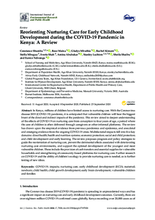Abstract
In Kenya, millions of children have limited access to nurturing care. With the Coronavirus disease 2019 (COVID-19) pandemic, it is anticipated that vulnerable children will bear the biggest brunt of the direct and indirect impacts of the pandemic. This review aimed to deepen understanding of the effects of COVID-19 on nurturing care from conception to four years of age, a period where the care of children is often delivered through caregivers or other informal platforms. The review has drawn upon the empirical evidence from previous pandemics and epidemics, and anecdotal and emerging evidence from the ongoing COVID-19 crisis. Multifactorial impacts fall into five key domains: direct health; health and nutrition systems; economic protection; social and child protection; and child development and early learning. The review proposes program and policy strategies to guide the reorientation of nurturing care, prevent the detrimental effects associated with deteriorating nurturing care environments, and support the optimal development of the youngest and most vulnerable children. These include the provision of cash transfers and essential supplies for vulnerable households and strengthening of community-based platforms for nurturing care. Further research on COVID-19 and the ability of children’s ecology to provide nurturing care is needed, as is further testing of new ideas.

